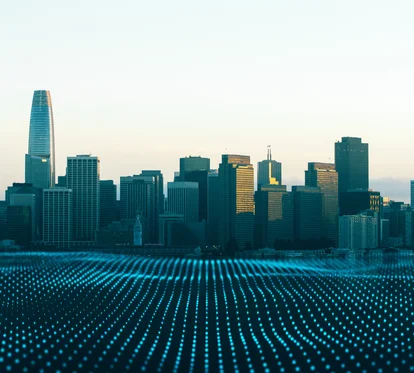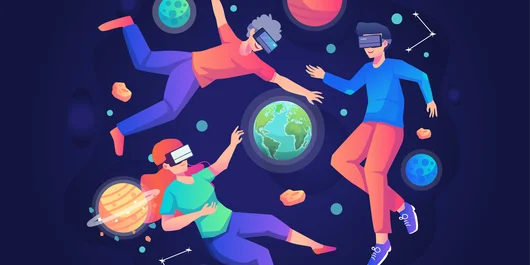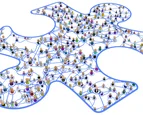“Complex social issues facing municipalities require technology that makes complexity manageable. Preferably technology that enables people to find and test creative solutions," says Edwin Fennema who is affiliated with Centric as a designer of digital life. The question he is asked most often is what exactly metaverse means. “The term is used for everything from a 3-D movie to a version-3 of the Internet and from a VR game to a Facebook invention." But metaverse is a construct rather than a conclusively definable thing, the author of Metaverse Management (due out in 2023) says with a smile. "Think of it as a kind of 'digital mode of existence,' or a new, parallel mode of existence. So it might be better to ask what we are going to make of metaverse than to want to know what it is now. After all, a mode of existence forms itself step-by-step.”
Promises of a metaverse

The metaverse is a vision of what many believe to be the next iteration of the Internet. Blockchain plays a vital role in this, as it brings together a host of data-driven technologies. For example, Internet of Things, artificially intelligent process control or a blockchain-driven, decentralized transaction economy. Edwin Fennema explains what metaverse is and what opportunities it offers.
A second life?
Many probably still remember Second Life. A virtual world that aroused a lot of curiosity some twenty years ago and in which the municipality of Zoetermeer was even the first to set up its own town hall. However, the promised second life never materialized and, two years after its opening, the municipality closed its doors again. Fennema: "All kinds of things happened in Second Life, sometimes very nice, sometimes less pleasant. In any case, it made one thing clear: the governance of a social, virtual world must be very well organized if you really want to take advantage of its opportunities. I think governance is an important precondition for success, also for metaverse.”
About metaverse
So at least Metaverse is regulated, he says. A virtually existing place, complete and rich, intended to offer residents an additional existence. Jointly and in addition to their lives in the physical world. Depending on what the (local) government wants to do with it, it can be an exact copy of the real world. But it can also be a fantasy world, in which other possibilities exist than in the real world. Metaverse and physical worlds remain connected, by the way. Through identification and data exchange, for example, but also, for instance, through augmented reality, which allows metaverse elements to be visible and interactively present in the physical world.

Activities
Metaverse has as its basis a 3D virtual (under)ground, buildings, layout and infra. With day, with night, with natural cycles and with weather and time. And furthermore a huge number of functions to live a virtual, parallel life: with encounters, care, creativity, conversation, work, meeting, experience, education, relaxation, commerce, collaboration, consumption, experiences, construction, ownership and participation. Embedded in a decentralized economy and transparent structure. And with legislation at the intersection of the physical world and a digital version of it. Technology, by the way, all of which is already - independently - in full development, says Fennema.
Residents
What can a (local) community do in or with metaverse? To answer that question we need to define community in metaverse a little more precisely, says Fennema. This is because, in addition to the 3D environment and its institutions, it consists of several types of inhabitants. There are 'meta-humans' of flesh and blood, who use their own graphic representation in metaverse, but also a relatively large group of 'meta-residents': virtually living people, animals, plants and organisms that only have a digital life. Their presence and the artificial intelligence they bring with them means that new, valuable, service functions can develop within metaverse. In particular, the purposeful forms of social interaction between meta-humans and meta-residents is thus an initial promise of metaverse.
Digital twins
Another promise is represented by new functions of digital twins. This term stands in the context of metaverse for data-driven copies of a physical environment, in which scenarios and simulations of the future are worked out. "In the context of environmental planning, mobility, new construction and quality of life, for example, this is very attractive for finding solutions that you would never think of otherwise," says Fennema. "It offers an excellent opportunity to arrive at a better, common interpretation of policy."
Social cohesion and customized guidance
Specifically, what can a municipality do with an initial virtual step? Fennema gives a few examples. Of course, you can create a virtual point of contact for delivery of traditional, municipal services. So can virtual versions of a school, a church, a library or a medical center. All opportunities where meta-humans and meta-residents can help and complement each other. "But it goes further. Whereas meeting one-on-one with others in a physical world is increasingly difficult, in metaverse it is actually very easy.
"That can have an open character, but also a directed character, for example in social counseling and coaching of residents, in addition to existing processes in the physical world. And where that is under pressure in the physical world due to a shortage of budget and people, scalability of such things is precisely the strength of metaverse, says Fennema. "That offers many opportunities for social support, individual counseling and also education, for example."
Governance
Building the first steps in a local version of metaverse requires involvement from a municipality itself. As a client, but also as an instigator of governance. How do you ensure legitimacy and safeguard our values in such a virtual, almost entirely parallel version of a municipal society? You do not turn Metaverse on or off; it exists as a self-supporting network, so it is important that laws and rules that we also value in physical society apply permanently. An important prerequisite here is that metaverse has no anonymous inhabitants and that enforcement of laws and regulations can take a different, more effective form. "This is the domain of the physical government as legislator and the virtual government as enforcer," thinks Fennema, who sees the governance section in particular as one of the most important components of a ‘metaverse for municipalities’.
Start with metaverse
Metaverse as a complete virtual municipality is not built quickly. Fennema: "It easily contains five hundred to one thousand technical components. I therefore recommend starting with a small area in which you would like to tackle one social task, for example. A virtual neighborhood, with a few hundred enthusiastic meta-people and at least as many meta-residents. You can learn and experiment with that. From there, in five to ten years, you build it into something much bigger.”
Centric hopes to experiment with building a piece of metaverse this way with about five municipalities this year. "We place the floor plan with the picket lines for the roads, greenery and places for housing, offices and stores. Then we will build, with the municipality and our partners, the things that best fit the task. This will then be able to grow incrementally." Fennema concludes, "If we discover that things work well in metaverse, that will prompt reflection on our approach in the real world. A fascinating prospect!"

'Metaverse Management' (H.L. van Boven and E.W. Fennema) will appear in bookstores and at managementboek.nl during 2023.


